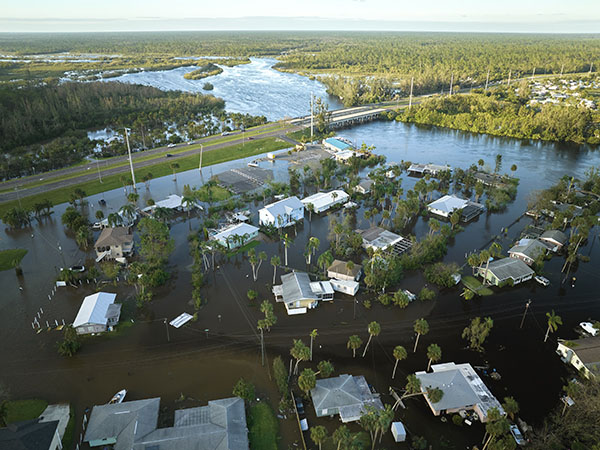For families displaced by floods, hurricanes, and other disasters, recovery doesn’t end when the waters recede or the storm passes. The real work begins in the long months that follow, rebuilding homes, restoring utilities, and reconnecting communities. Roads, housing, and public facilities must be restored so families can return, and life can resume. That’s where Right of Way (ROW) services play a vital role: creating the foundation for recovery by ensuring housing, infrastructure, and public services can be rebuilt in a way that is resilient, compliant, and sustainable for the future.
Disaster recovery is not just about rebuilding what was lost. For states, counties, municipalities, and their engineering and consulting partners, ROW services are a cornerstone of successful recovery and grant-funded project delivery.
What ROW Brings to Disaster Recovery
ROW services are essential in disaster recovery through:
- HMGP and CDBG-DR compliance: Acquisition and relocation activities tied to housing recovery, infrastructure, resilience, and economic development must comply with the Uniform Relocation Assistance and Real Property Acquisition Policies Act (URA). ROW professionals safeguard funding eligibility by ensuring these requirements are met.
- Supporting housing redevelopment projects: Whether through land assembly, buyouts, or relocation assistance, ROW ensures that housing recovery programs can move forward efficiently.
- Stakeholder engagement: By facilitating negotiations with property owners with empathy and clarity, ROW specialists balance the need for expediency with fairness and transparency—critical for maintaining public trust and regulatory integrity.
- Site control for housing projects: Land assembly and easement acquisition provide the foundation for new residential construction, temporary housing solutions, and redevelopment initiatives.
- Facilitating federal and state recovery programs: Large-scale infrastructure improvements depend on timely land acquisition that follows Uniform Relocation Assistance and Real Property Acquisition Policies Act (URA) and other regulatory requirements.
These services lay the legal and logistical groundwork that makes the overall community recovery possible.
Real-World Projects that Rebuilt Communities
ORC has worked across the country to support local, state, and federal disaster recovery programs. Below are several projects that highlight how ROW services restore both infrastructure and lives. These projects, spanning North Dakota to Louisiana, demonstrate how ROW services address both immediate housing needs and long-term resilience.
Minot, North Dakota – Souris River Disaster Recovery
Following the devastating 2011 Souris River flood, ORC was contracted by CDM Smith to acquire a 36-pad mobile home park. Limited housing availability in the region made relocation particularly complex. ORC agents helped secure suitable housing options and navigated challenging market conditions to ensure fair outcomes for residents.
Outcome: Enabled the city to proceed with vital flood protection infrastructure while supporting displaced families.
Charlotte, North Carolina – Quick Buy Flood Mitigation Program
Under a contract with Mecklenburg County Storm Water Services, ORC completed three key projects:
Shannon House Project: Voluntarily relocated tenants following FEMA and North Carolina Emergency Management guidelines.
Selwyn Village Condominiums: Acquired four residential condos to stop repeat flood losses in a joint venture with the Parks & Recreation Department.
2011 Flood Acquisitions: Acquired 11 damaged residential structures through a voluntary program.
Outcome: Reduced long-term flood risk, preserved public safety, and enabled redevelopment in safer zones.
Staten Island, NY – New York Rising Buyout Program (GOSR)
ORC supported the Governor’s Office of Storm Recovery in Hurricane Sandy’s aftermath, completing over 50 permanent relocations in Staten Island and coordinating more than 90 temporary relocations.
Outcome: Provided immediate relief to affected residents and cleared high-risk flood zones for future mitigation projects.
San Antonio, TX – Renaissance Village Apartments (SARA)
ORC assisted the San Antonio River Authority in relocating 14 elderly residents from an independent living facility after they were displaced without access to URA benefits. ORC agents conducted a detailed benefit analysis and provided multilingual support to ensure full compliance and dignity throughout the process.
Outcome: Ensured equitable relocation and restored access to services for a vulnerable population.
Louisiana – Chennault Mobile Home Park Relocation (LCTCS)
As a subconsultant to CDM Smith, ORC relocated residents of a mobile home park in Lake Charles, LA, to make way for a workforce training facility funded through the Hurricane Gustav/Ike Infrastructure Program.
Outcome: Advanced workforce readiness and economic resilience in a region rebuilding from repeated hurricane impacts.
Compassion, Clarity, and Coordination in Disaster Recovery
Disasters deeply affect people’s lives and sense of security. ROW professionals must approach every conversation and transaction with care.
At ORC, our team:
- Communicates clearly and consistently
- Takes a trauma-informed approach to negotiation
- Works collaboratively with local leaders and agencies
- Ensures every property owner understands their rights and options
This human-centered approach isn’t just ethical, it’s effective. It builds trust during uncertain times and results in a smoother, faster recovery.
Planning for Resilience, Not Just Response
As climate risks rise, resilient infrastructure must be prioritized in public planning. That includes:
- Incorporating ROW into mitigation planning
- Using voluntary buyouts to reduce repeat losses
- Ensuring equitable treatment for displaced residents
- Securing access quickly when disaster strikes
Resilience isn’t just about rebuilding what was lost; it’s about building smarter, stronger systems for the future.
ROW as a Force for Recovery and Renewal
Community resilience begins with access to land, to housing, and to a safer future. Right of way professionals quietly enable that access every day after a disaster. Whether coordinating buyouts, supporting infrastructure restoration, or simply listening with empathy, we are proud to be part of rebuilding what matters most.
At ORC, we don’t just restore roads and rights, we help families return home, neighborhoods thrive again, and communities prepare for a stronger, safer future.
Let’s build resilience together.
Connect with ORC to discuss how our ROW experts can support your disaster recovery and mitigation projects.

